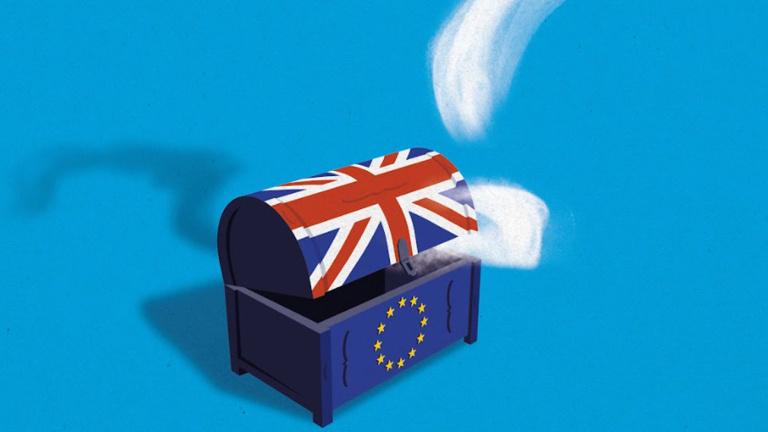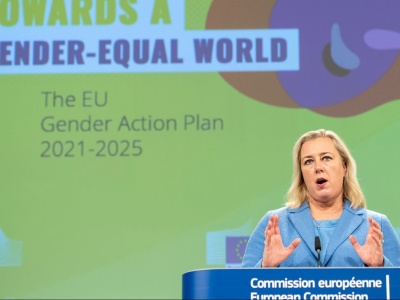
How ‘to trade or not to trade’ is the question for third countries after Brexit
What does Brexit mean for trade relations between third countries and the current 28 member states of EU? And how will Brexit affect future trade with the UK and EU 27?
The simple answer is increasing uncertainty. And, as we know, markets do not like uncertainty, nor do policymakers, except perhaps some British ones. All EU trade partners are on the alert. However, specific consideration is needed for developing countries. Brexit could significantly impact their economic development through its impact on their trade relations.
Uncertainty
Until 29 March 2019, the UK continues to be an EU member, and thus current EU trade and regulatory regimes apply. However, economic operators and traders may adjust their activities in anticipation of Brexit, so trade and investment flows may be affected earlier.
Transition period
The UK and EU 27 are working towards a transition agreement covering the period from 30 March 2019 until end 2020. Should they fail to conclude or ratify such an agreement, there will probably be a “hard Brexit” (a “no deal” Brexit). In terms of trade, this means that the UK will be out of the EU customs union and out of the single market, will have no trade agreement in place with the EU 27, and will have to establish its own trade regime towards third countries.
To avoid a shock and allow time for the UK and EU 27 to define their new trade regimes, the UK could remain in the EU customs union and EU single market during the transition. This would mean that trade relations between third parties and the UK would continue to be determined by the EU 27’s various trade regimes: its bilateral free trade agreements (FTAs), unilateral trade preferences (GSP, GSP+, and EBA), and most favoured nation (MFN) tariffs at the World Trade Organization (WTO).
However, some UK or EU 27 trade partners might object to this arrangement, arguing that EU FTAs and WTO obligations apply only to the territories of EU member states, which the UK would no longer be as of 30 March 2019. The UK would not be able to adopt alternative trade regimes with these third countries unless it left the EU customs union during the transition period. While such a scenario seems unlikely, the point here is that third countries do not have to accept the transition agreement between the UK and EU 27 as a fait accompli, at least with respect to trade.
Trade post-Brexit, beyond 2020
Beyond the transition period, third countries’ trade relations with the UK will depend on the trade regime the UK adopts. That, in turn, depends on the UK’s trade and regulatory relations with the EU 27. If the UK stays in a customs union with the EU 27, it must continue applying the EU 27 common trade policy and trade regime, on which it will have no say. Other countries will not have the possibility to negotiate special trade deals with the UK, and will have to consider the implications of any new EU 27 trade negotiations or arrangements on their trade with the UK.
If the UK remains in a customs union with the EU 27 but leaves the EU single market (the ‘Turkey model’), this would impact third countries’ trade relations with both the UK and the EU 27. This is because trade flows are not only affected by trade barriers (such as tariffs and quotas), but also by a whole set of regulatory issues and standards embodied in the EU single market. New compliance requirements may seriously disrupt trade, increasing time and costs in terms of administrative burden and logistics. Integrated supply chains within the EU 28 may be broken up if trade via the UK becomes more complicated. This may lead suppliers and traders to use different channels to reach the UK or EU 27 markets. To avoid regulatory barriers, the UK may thus opt to stay in the EU single market.
The UK could remain in the EU single market, but keep its trade policy autonomy by leaving the EU customs union. This would be along the lines of the ‘Norway model’ with the European Economic Area. Alternatively, the UK could opt to stay in both a customs union with the EU 27 and the EU single market, in which case the UK must continue to apply both the EU trade and regulatory regimes (to the dismay of Brexiteers).
The UK could remain outside both the customs union and the single market, opting instead to negotiate an FTA with the EU. This has been referred to as the ‘Canada model’, as Canada’s is arguably the most advanced EU FTA to date.
Finally, if no trade deal is struck, the UK will have no special trade relationship with the EU.
The UK, trying to have the best of both worlds, has tabled proposals for a tailor-made, à la carte UK trade and regulatory convergence with the EU 27. One idea is a customs partnership, whereby the UK would formally stay outside the EU customs union but would mirror EU trade policies and collect tariffs on behalf of the EU 27. Another is the maximum facilitation (‘max fac’) plan to facilitate, through technologies still to be developed, border cooperation and regulatory alignment with the EU 27. These would not cover services, however. As for the EU 27, the main concern remains to preserve the integrity of the EU customs union and single market.
While mainly triggered by concern within the UK and Ireland to avoid a hard border between Ireland (a member state of the EU 27) and Northern Ireland (part of the UK), the choice of arrangement between the UK and EU will directly affect third country trade relations with both the UK and the EU.
Third country considerations
EU trade regimes will overall not be affected by Brexit, as EU trade obligations and arrangements will remain in place, including EU FTAs.
However, trading with the EU 27, without the UK, will mean trading with a smaller market than previously. This might render the EU 27 market less attractive, affecting the balance of power and weight of tariff concessions and liberalisation commitments made in the context of an FTA with the EU. This is unlikely to be very significant for most EU 27 partners. It may, however, open the door to review and renegotiation of trade arrangements with the EU.
In this context, it is worth mentioning tariff-rate quotas (TRQs), a very technical but important issue, both in the context of the WTO and some EU FTAs, where the EU-28 has committed to reduce tariffs on specific volumes of imports of particular, usually agricultural, products; the UK and the EU-27 have proposed ways to divide these quotas post-Brexit, mainly based on historical trade flows, an approach that some WTO members have already contested, suggesting that negotiations on this issue may be needed.
More significant will be the need or opportunity for third countries to negotiate new trade arrangements with the UK should it leave the EU customs union. First, the UK will have to set new unilateral trade policies, including commitments at the WTO, which require approval of all WTO members. Third countries may use this opportunity to encourage the UK to have a more open trade policy than the EU 28. These unilateral policies will also include UK preferential trade regimes. The UK will formulate a new generalised system of preferences (GSP), in which developing countries may wish to be defined more favourably than in the current EU 28 GSP. New FTAs will have to be negotiated, based on the EU model or not. To speed up the transition, the UK is proposing ‘grandfathering’ (i.e., copying provisions of) current EU 28 FTAs into new UK FTAs, with only minor technical adjustments. These could then be opened up later for re-negotiation. This is because the UK does not have the capacity to negotiate multiple FTAs at once.
Considerations for ACP countries
Several African, Caribbean, and Pacific (ACP) countries trade with the EU under economic partnership agreements (EPAs). Should the UK not remain in the EU customs union, these will no longer apply to the UK, nor will any other EU FTA. For countries unhappy with their EPA, exclusion of the UK may be a positive, lessening the impact of the agreement. It may also provide a justification for renegotiating these agreements (the EPAs include an MFN provision, suggesting that any preferential treatment that the EU 27 would grant to the UK post-Brexit and which would be more favourable than those under the EPA should be extended to the EPA countries). For ACP countries that are particularly reliant on trade with the UK, such as South Africa and Kenya, concluding an additional FTA with the UK may become an imperative.
Trade negotiations between the UK and ACP countries, especially African countries, will face numerous challenges though. First, the UK is unlikely to prioritise negotiations with African countries while it seeks to establish trade arrangements with more commercially important trading partners. Second, negotiations with individual countries, such as Kenya, may be seen as weakening regional integration processes in Africa; but negotiating with blocs of African countries will likely run into the same difficulties as the EPA negotiations, as many of those agreements are applied by only a subset of the members of the respective African regional blocs.
Some argue that the African Continental FTA may provide impetus for African Union FTAs with third countries. However, it is difficult to see how this would work in the context of an agreement with the UK. Nevertheless, given that Brexit will affect a large number of ACP countries, and they will therefore have an interest in either development of a future UK unilateral preferential trade regime or future bilateral agreements with the UK, some form of international cooperation may be helpful, including through the ACP Group or the African Union configuration (and in the context of post-Cotonou negotiations). Some degree of convergence between trade regimes with the UK and the EU 27 might also be beneficial, to reduce transaction costs and foster integrated value chains.
About the authors
San Bilal, head of programme Trade, Investment and Finance, ECDPM, Twitter: @SanBilal1 and Sean Woolfrey, policy officer Economic and Agricultural Transformation Programme, ECDPM, Twitter: @SeanWoolfrey
Read the full magazine issue









